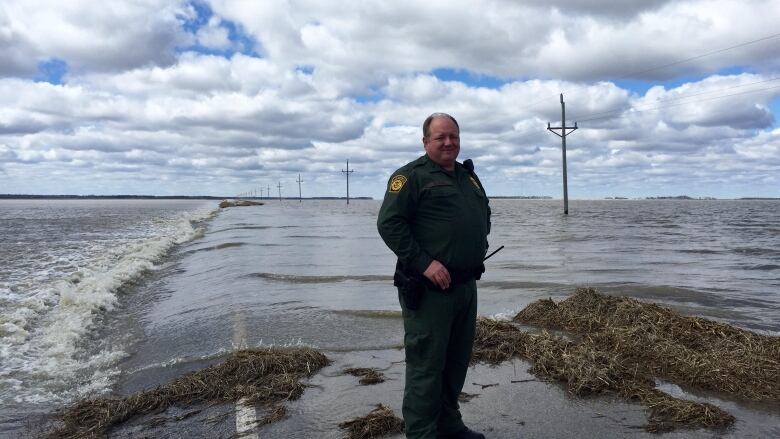Spring flooding in Manitoba changing route of asylum seekers
Some say illegal border crossers won't find the terrain or the people as welcoming

Spring flooding is complicating the crossing for some asylum seekers walking over the international border into Manitoba and forcing some to sneak over by a different route.
All winter, would-be refugee claimants have been walking across snowy, wind-swept farmer's fields, but in the last week, warm weather has brought spring flooding to the nearby Red River and its tributaries.
"The ditches are pretty deep on either side of the road. We'd be over our heads, I don't think we'd stand a very good chance. There's not much worse than cold water to do you in pretty quick," said Eric Kuhn, agent in charge of the U.S. Border Patrol at Pembina, N.D.
We're not going to let anybody drown in a ditch for bureaucratic wrangling- Eric Kuhn, U.S. Border Patrol
Municipal officials in both countries are ready in case they need to do a water rescue, although they say things can get complicated if they are on one side of the border and the victim is on the other.
It's technically illegal for them to cross the border, even in an emergency. However, Kuhn said there are mutual aid agreements if someone is in mortal danger.
"Life takes precedence. If there's an issue like that, contact us, get us in the loop and we'll work together on getting it done," he said.
"We're not going to let anybody drown in a ditch for bureaucratic wrangling. We're not going to let anybody die out here."
Refugee claimants from U.S.
Under the Safe Third Country Agreement, Canada generally does not accept refugee claimants coming from the U.S., but there are exceptions.
Canada is also a signatory to the United Nations Refugee Convention, so those who sneak through the border at an unofficial point of entry can legally make a claim here.
Since January, resettlement workers say they've helped 360 people who have crossed at Emerson, but the flood conditions mean some asylum seekers are now finding other places to cross further east.
Trying another route
People living between Tolstoi, about 50 kilometres east of Emerson, and Piney, about 110 kilometres east, tell CBC News they have already spotted asylum seekers.
Kuhn has been told of at least one group that crossed recently at the Tolstoi, Man., port-of-entry, which closes between 10 p.m. and 8 a.m.

While Emerson has been dealing with the crisis for months and has appealed to Ottawa and the province for help with refugees arriving, these communities are even smaller and have no means of dealing with them.
Shelley Ellis, who lives about three kilometres from the Tolstoi border crossing, is concerned about who might be coming in.
"We're paying taxes and we're living our life and people are just walking across that aren't supposed to be here. I think the government should take care of the people that are here first, the people that need help, the low-income families, the veterans, before welcoming everybody," she said.
"It's the ones that aren't up to any good that are hiding. That's always a worry."
Just up the highway, gas station owner Rick McIntyre believes it's just a matter of time before someone gets hurt.
Strangers banging at the door
"We read in papers and heard from over there [at Emerson]. They're banging on doors, trying to open doors, you might do it at the wrong place. If it happens here, there's four big dogs that come out," he said.
"There's a lot of people have a lot of guns out here."
Near Vita, Man., local residents know there are many places to walk across the border undetected. This region is historically known as a bootlegging route.

A well-maintained road, site of a long-decommissioned border crossing, is guarded only by a trail camera hidden high up in a tree.
"The border is not secure. It's Swiss cheese," Rob Jirasek said, as he gestured to a row of concrete barricades and bushes marking the international line between Minnesota and Manitoba near Vita. "This is it, it's just as easy as crossing over your neighbor's yard in the city. You can walk right on through."
Jirasek is not impressed with the numbers of people coming to Canada to claim refugee status, especially those who have already had asylum claims rejected in the U.S. and are awaiting deportation orders.
Holds Trudeau responsible
He said Prime Minister Justin Trudeau is to blame after he tweeted in January: "To those fleeing persecution, terror and war ... Canadians will welcome you."
"You can't just open your arms and say 'Yes, come on in. We're going to take care of you.' We can't even take care of our own," he said.
- Here's how Canadian taxpayers and private agencies help asylum seekers
- From Somalia to Manitoba: A look at the long journey of asylum seekers
"People need to know that you can't just jump the border and walk across and claim asylum. ... There's not a civil war in the U.S., there's zero for them to be scared of except being deported back to their own country."
To those fleeing persecution, terror & war, Canadians will welcome you, regardless of your faith. Diversity is our strength <a href="https://twitter.com/hashtag/WelcomeToCanada?src=hash">#WelcomeToCanada</a>
—@JustinTrudeau"I can't answer for other people but I know I won't be serving them coffee and donuts," Jirasek said.


